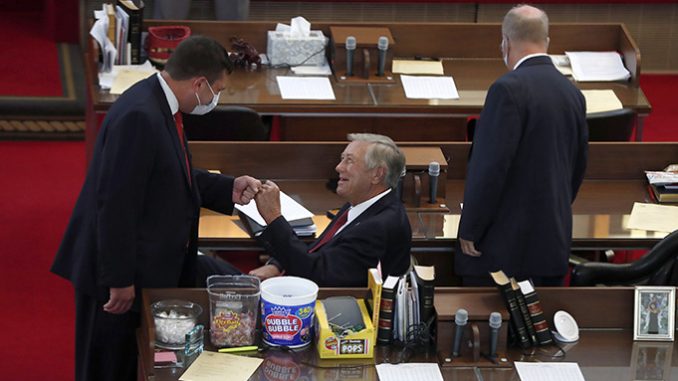
RALEIGH — The North Carolina General Assembly returned last week to pass another round of COVID-19 relief funding.
House Bill 1105, titled the Coronavirus Relief Act 3.0, passed through both houses with strong bipartisan support, passing the Senate 44-5 and House 104-10. The only members of either house to vote against the bill were Democrats.
The bill was sent to Gov. Roy Cooper and was signed into law late last week.
The proposal has $115 million for education, including $6.5 million to eliminate waitlists for the Children with Disabilities Grant Program and the Education Savings Account Program as well as $35 million for childcare assistance. Another $10 million will go towards internet connectivity for students, $17 million in grants for exceptional children’s services and $30 million for the GREAT program to improve rural broadband access.
In order to keep funding for schools stable, a “hold harmless” provision for districts that see declining enrollment is also in the bill.
The one-time bonuses that Cooper wanted for teachers and education staff is not included in the relief measure. The governor twice vetoed pay increases for teachers in 2019, one of which came within half a percent of his own proposal.
The bill expands the threshold for the popular Opportunity Scholarship Program (OSP) to help offer families more options during school closures. The original household income threshold for the OSP was 133% of the amount required for the student to qualify for federal free or reduced lunches. The bill expands that threshold to 150%.
Another change to the OSP is elimination of the cap on awards for students entering kindergarten and first grade. The OSP provides up to $4,200 a year to eligible low-income families to use at the private school of their choice.
Senate Democrats attacked the idea of expanding the program, despite the fact that nearly 1 million of the state’s 1.5 million K-12 students are not in the classroom due to districts offering no option besides remote instruction.
Phil Berger noted at a press conference that “Senate Democrats said that there are, quote, ‘better, smarter uses’ for Opportunity Scholarship funding.
“How can it be that in a society so focused on equality, it’s okay for a major political party to say making decisions about your child’s education is reserved only for the wealthy elite?” Berger asked.
Families struggling with unexpected financial issues with remote learning and childcare as a result of school closures are also getting help. The bill includes $440 million to issue one-time payments of $335 to families with at least one child under the age of 17. Those payments will go out by Dec. 15. There is no minimum income requirement and the maximum income eligibility mirrors the federal threshold for the Child Tax Credit.
Sen. Wiley Nickel (D-Wake) questioned giving the funding to families in an interview with WNCN, complaining that Democrat “priorities” like Medicaid expansion were not included in the relief bill.
“Helping people, stimulating the economy is good. But the question is, what are we not doing by giving money to families?” said Nickel.
Senate Leader Phil Berger (R-Eden) said that families need and deserve the grant money.
”I know $335 isn’t going to pay off a mortgage, but it will put a dent in the cost of electronic devices or help pay for a tutor if a child can’t seem to tackle a new concept or maybe it will pay for a sitter and a dinner out,” Berger said “I’m really not worried about how parents spend that $335. All I know is they need it. They deserve it.”
Other spending in the bill includes $75 million for PPE, $34 million for testing and tracing, and $20 million for COVID treatment for the uninsured.
Unemployment insurance is also getting a boost of $50 more a week. That translates to $200 more per month and without raising employer taxes. Additionally, $50 million will go to the Lost Wages Assistance Program and the small business grant program will also be getting $45 million.



